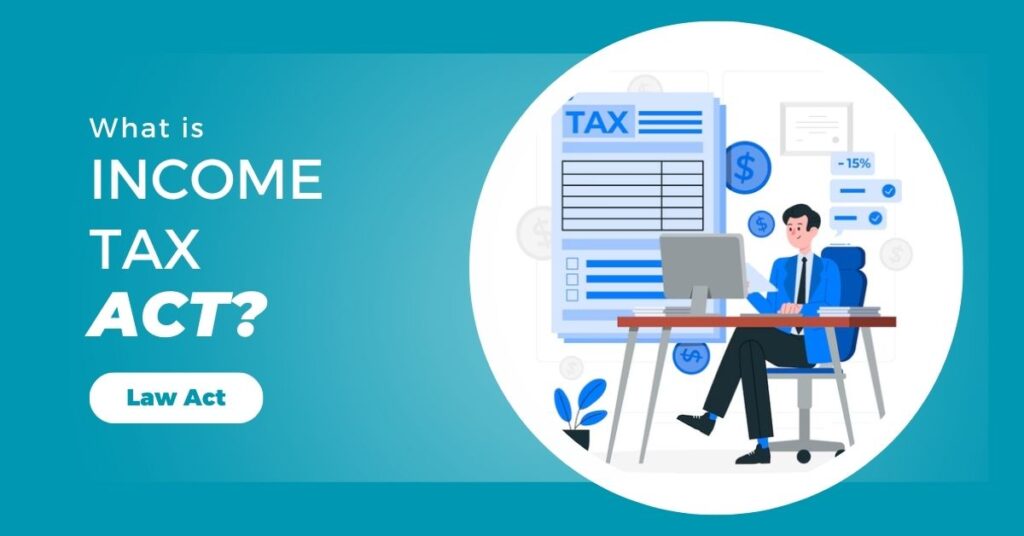The Income Tax Act, 1961 is one of the most important laws in India. It is a law that helps the government collect income tax from people and businesses. This Act explains who has to pay tax, how much tax they need to pay, and how the government will collect that money.
This law was passed in the year 1961 by the Parliament of India. Since then, it has been updated many times to match the changing economy and financial system of the country.
Let’s understand everything about the Income Tax Act, 1961 in simple words.
What is the Income Tax Act, 1961?
The Income Tax Act, 1961 is a law made by the Government of India to collect money from people and companies who earn income. This money is called income tax.
This Act has many rules and sections that explain:
- Who should pay tax
- How to calculate tax
- What incomes are taxable
- What incomes are not taxable
- When to pay tax
- How to file tax returns
The Act helps the government get funds to build roads, schools, hospitals, and carry out other welfare schemes for the country.
Why Was Income Tax Act, 1961 Created?
Before 1961, India had other tax laws. But they were old and not suitable for a growing economy. So, the government needed a new and complete law to manage everything related to income tax.
That’s why the Income Tax Act, 1961 was passed. It brought all the income tax rules under one law. It replaced the older laws and gave a fresh start to the tax system of India.
Who Has to Pay Income Tax?
According to the Income Tax Act, 1961, the following types of people or entities need to pay tax if they earn income:
- Individuals (such as salaried people or business owners)
- Hindu Undivided Families (HUFs)
- Companies
- Firms and Partnerships
- Associations and Trusts
- Local Authorities
- Any Other Legal Entity
Whether you live in India or outside but earn income in India, you may have to pay tax here.
Types of Income Covered
The Act says that tax has to be paid on total income. This income can come from different sources. The Act divides income into five main categories:
- Income from Salary – If you are working and getting a salary
- Income from House Property – If you earn rent from property
- Profits from Business or Profession – If you run a business or work as a freelancer
- Capital Gains – If you earn from selling land, shares, or other investments
- Income from Other Sources – Like lottery, interest, gifts, etc.
Each type of income is calculated separately and then added to get the total income.

How Is the Tax Calculated?
The Act gives a tax slab system, especially for individuals. This means the amount of tax you pay depends on how much income you earn.
- People with lower income pay less tax
- People with higher income pay more tax
The government announces these tax slabs every year in the Union Budget.
There are also deductions and exemptions under sections like 80C, 80D, 10(14) etc. These help in reducing your total taxable income.
For example, investing in a life insurance policy or mutual fund can help you save tax.
Income Tax Return (ITR)
The Income Tax Act, 1961 requires people to file their Income Tax Return (ITR) every year. This is like a form where you tell the government:
- How much you earned
- How much tax you already paid (through TDS or advance tax)
- How much more you need to pay or get back as refund
Filing ITR is mandatory if your income is above a certain limit. Even if it is not required, many people file it for record-keeping, taking loans, or applying for visas.
Important Sections of the Income Tax Act, 1961
There are over 300 sections in the Act, but here are a few important ones:
- Section 80C – Deduction for investments like PPF, LIC, etc.
- Section 80D – Deduction for medical insurance
- Section 10 – Exemptions like HRA, LTA
- Section 139 – Filing of returns
- Section 234A/B/C – Interest for delay in filing or payment
- Section 194 – TDS rules
These sections are updated regularly, so it’s always good to check the latest version or consult a tax expert.
Role of CBDT
The Central Board of Direct Taxes (CBDT) is the main authority that manages and looks after the working of this law. It works under the Ministry of Finance.
CBDT makes rules, sends notifications, checks returns, and ensures that people follow the law. If someone tries to hide income or not pay tax, the CBDT can take action.
Penalties for Not Following the Act
The Income Tax Act also has penalties and punishments. If someone:
- Doesn’t pay tax
- Files a false return
- Tries to hide income
- Fails to file ITR
Then they can be fined or even jailed in serious cases.
That’s why it’s important to follow the law honestly.
How Does the Act Help the Country?
Income tax collected under this Act is used for:
- Building roads and bridges
- Funding schools and colleges
- Paying salaries to government workers
- Giving free healthcare to poor people
- Running defense and security systems
So, when we pay income tax, we are actually helping build a stronger and better India.
Recent Changes in the Income Tax Act
The Income Tax Act keeps changing to match current needs. Some recent changes include:
- New Tax Regime (optional for individuals) with lower tax rates but fewer exemptions
- Digital filing and processing of ITRs
- Pre-filled ITR forms
- Faster refunds
- More focus on high-value transactions
These updates make tax filing simpler and faster.
Conclusion
The Income Tax Act, 1961 is a very important law in India. It helps the government run the country by collecting money in the form of taxes.
Understanding the basics of this Act helps every Indian become a responsible taxpayer. Even though the Act has many rules and sections, its main goal is simple — to collect tax in a fair and clear way.
Whether you are a student, a salaried person, a business owner, or a retiree, it’s good to know how this law works. If needed, you can always consult a tax expert for help.
Paying tax is not a burden — it’s our contribution to the nation.
Also Read:
- Understanding Tax Invoices
- HSN Code For Ms Pipe
- A Complete Guide to NIC Code: What It Is & Why It Matters for Your Business
Frequently Asked Questions
What is the purpose of Income Tax Act, 1961?
The Income Tax Act, 1961 is a law made by the Indian government to collect tax from people and businesses. The money collected is used for public services like roads, hospitals, education, and defense. It also sets clear rules for who should pay tax and how.
Who needs to pay income tax in India?
People who earn income in India may have to pay tax. This includes salaried employees, business owners, freelancers, companies, and even people earning from rent or investments. If your income is above a certain limit, you are required to pay tax according to this law.
What are the five heads of income in the Act?
The Act divides income into five heads: salary, house property, business or profession, capital gains, and other sources. Each category has its own rules. Your total taxable income is calculated by adding earnings from all these sources, after applying exemptions and deductions.
How is income tax calculated in India?
Income tax is calculated based on how much money you earn in a year. The government has tax slabs that show how much tax different income levels must pay. You can also reduce your tax by using deductions like those under Section 80C or 80D for investments and insurance.
What happens if I don’t file my income tax return?
If you don’t file your income tax return, you may have to pay a fine or penalty. In some cases, if the government finds that you are hiding income, it can even take legal action. Filing your return on time helps you stay safe and also claim refunds.



